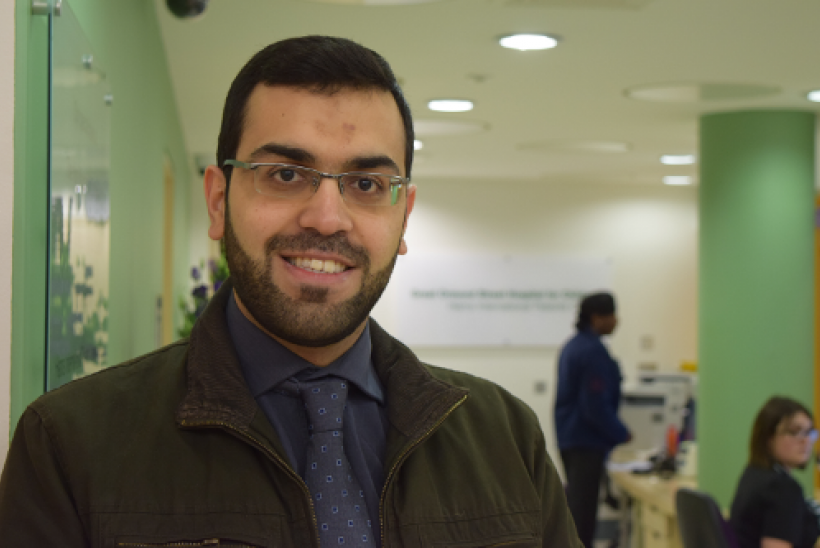International collaboration encouraged by paediatric expert to develop specialised skills of overseas doctors
It was after working in NBK Hospital’s Haematology and Oncology ward in Kuwait for a few months when Dr Abdullah decided he was keen to advance his study in the field of Haematology and Oncology paediatrics. With GOSH’s world-class facilities and particular expertise in both specialisms, Dr Abdullah saw a placement at GOSH as a great opportunity to further his passion for Haematology and Oncology, and to bring back ideas that will strengthen paediatric healthcare in Kuwait. The Ministry of Health sponsored Dr Abdullah on his visit to the hospital, allowing him the opportunity to develop his skills in haematology and oncology.
“What attracted me to GOSH is its international reputation. When I started my paediatric training, I saw many Kuwaiti patients coming back from GOSH from different specialties, mostly from the Haematology and Oncology department. Therefore, I thought it would be useful to get to know this hospital more, especially considering its reputation as one of the leading hospitals in the world. I spoke to one of the consultants at NBK hospital to express my interest in Haematology and Oncology. He recommended GOSH and put me in touch with Dr Phil Ancliff,” Dr Abdullah said.
Despite feeling a bit lost to begin with when arriving in London, Dr Abdullah commented that this initial sense of unease quickly changed thanks to the friendliness of the team at GOSH. Dr Abdullah explains that by visiting GOSH, a hospital which sees over 1,500 children from the Middle East region each year; it has given him the chance to gain experience in conditions he would not usually get the chance to see back home, due to Kuwait’s smaller population. It has also given him the opportunity to take part in inclusive clinical discussions about the latest findings in Haematology and Oncology with leaders in the field.
“I especially enjoyed Thursday mornings as this is the time of the week where consultants discuss different cases and their different opinions. This collaborative approach was very enlightening and it was great to have my input valued even though I am a junior. On one occasion I was talking to Dr Ancliff about acute leukaemia and instantly, after about 30 minutes, he sent me an article about it. It’s this sort of enthusiasm about learning and exploring techniques that ultimately forms better doctors. Speaking to consultants in the department made me realise how fascinating the field of leukaemia is and all the areas where we could learn and explore. The past 4 weeks of collaborating with leading experts has made me think ‘I really wanna do this!’”
Speaking about the experience, Dr Ancliff, Consultant in Paediatric Haematology at GOSH, stresses how this collaborative work plays a crucial role in developing healthcare. “Collaborative work should always be encouraged amongst healthcare professionals. It helps promote a more educated, skilled and engaged workforce. It was a great privilege having Dr Abdullah choose to visit us in order to learn more about the areas of Haematology and Oncology. I believe, through this active collaboration, together we have sparked his enthusiasm and passion for further specialising in the area which he will then be able to apply in Kuwait.”
Commenting on what he plans to bring back to Kuwait, Dr Abdullah mentions how he would like to promote the idea of a multidisciplinary team more amongst future physicians in Kuwait. Multidisciplinary working is when professionals from a range of specialities collaborate to deliver comprehensive care that addresses as many of the patient's needs as possible.
“The multidisciplinary area is not as established here in Kuwait as it is in GOSH; we have started it already but I think there’s still more which could be done,” explains Dr Abdullah. “It is important to analyse cases from a medical perspective and through the eyes of a haematology expert, but what this experience taught me is the need to also cater to the non-medical elements of every case such as social support and education. It is widely reported by colleagues at GOSH that benefits of this collaborative working include improved health outcomes for patients, the more efficient use of resources and enhanced job satisfaction for team members.”
Further, Dr Abdullah was amazed at the lengths GOSH go to in order to make the hospital like home for children and parents who visit. “It is the small details which make a big difference. For example, GOSH have a team of interpreters for all different languages available, and even have window cleaners who dress up in superhero costumes; it is a very friendly environment for children.”
“I would definitely recommend this experience to other colleagues in Kuwait. The level of research and clinical experience at GOSH is more advanced when compared to Kuwait. It is always good to have a reference point, and GOSH has been a good benchmark to many of our doctors. I hope we can we can continue this collaboration in the future to further develop the skills and expertise of our doctors in Kuwait,” Dr Abdullah concluded.


